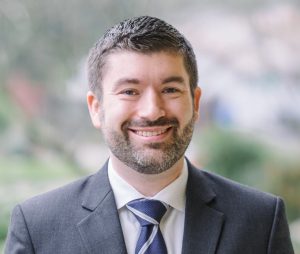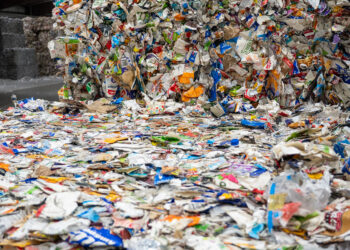As the new CEO of the Oregon Beverage Recycling Cooperative, Jules Bailey is focused on growth, convenience and supporting the community.
“There’s a legacy here to protect and it’s exciting. It’s also somewhat terrifying,” he told Resource Recycling. “You’ve got the most successful bottle bill in the nation – this the Oregon model, as it’s come to be known. Great, don’t mess that up.”
The Oregon Beverage Recycling Cooperative (OBRC) is the group of beverage distributors that runs Oregon’s bottle redemption program, the BottleDrop network. The program, which is unique in that it is run by a nonprofit cooperative of distributors and not the state government, boasts a redemption rate consistently above 80%.
Bailey is succeeding John Andersen, who created the cooperative and left his role of president at the end of 2022 to focus on a family-run business.
“Jules has made a tremendous impact during his time at OBRC thus far, and we have no doubt he will continue this momentum as our new CEO,” Eric Forrest, president of Eugene-based Bigfoot Beverage and chair of the OBRC board of directors, said in a press release. “His vision, acumen and leadership will usher in a new era for OBRC as we continue to push creativity, technology and innovation.”
Bottle bill ‘part of your DNA’
Bailey, formerly an economist, started at OBRC in 2016 as its chief stewardship officer. After Andersen announced his departure, Bailey was selected as incoming CEO and was made executive vice president in 2022 to allow him to prepare. Before joining OBRC, he was Multnomah county commissioner and an Oregon state legislator in 2008.
However, he said growing up in Oregon, the bottle bill was “just part of your DNA.”

“I remember as a kid saving up bottles and cans and going and returning them, and I’d use that money to go buy comic books at Excalibur Comics [in Portland],” he told Resource Recycling. “So I’d always sort of been thinking about it.”
Then, during his time as a legislator, he helped modernize the state bottle bill. After bottled water was added in 2007, Bailey said “there was a sense after the work group was over that there was still a lot more that needed to happen.”
Bailey got involved, and ultimately the co-op model was passed, which made the day-to-day operations of the system private and put a nonprofit coalition of beverage distributors in charge, alongside a requirement that the refund value on covered containers would increase from 5 cents to 10 cents if certain performance targets were not met.
In 2016, Oregon was at a 64% return rate. The increased refund value went into effect in 2017, and in 2018, the state hit over 90% redemption.
Bailey ran for Portland mayor in 2016, but then left politics. He said he chose to come to OBRC because he wanted to make a difference “that is meaningful to Oregonians, that allows me to do good work on behalf of the community and the environment, but also do it in a context where it reflects something that’s kind of unique for Oregon.”
Growing the Green Bag program
When Bailey started at OBRC, he had three main areas of focus as the chief stewardship officer: developing a refillable glass bottle program for craft beer, handling the growing popularity of the BottleDrop Green Bag program, and getting the co-op’s government and public affairs division organized.
The refillable program was “my baby from the beginning,” Bailey said.
“We took it from this very amorphous idea all the way to literally there’s products on the shelves at our local grocery store,” he said. “I remember going to the grocery store after the first product was on the shelves and I got my six-pack of refillable bottles. And I was just like a kid in a candy store.”
Today, there are around 2.5 million refillable bottles in circulation in Oregon.
As for the Green Bag program, which allows users to fill bags with containers and drop them off for processing, it was exploding. At the end of 2016, there were around 70,000 Green Bag account holders, Bailey said.
“You had to sign up on paper. You had to go to your local BottleDrop and it was like a boutique program run by every individual BottleDrop,” he recalled, with each BottleDrop location keeping its own files and handling issues on their own.
“There was no centralized processing, no centralized trucking,” he said. “But we just watched the trend lines on this and it’s more popular, more popular, more popular. We realized, OK, we need to really run with this.”
Stores started asking if they could host Green Bag drop sites, so Bailey organized the first one, in the small city of Estacada outside Portland at the end of 2016.
Today, there are around 960,000 account holders and BottleDrop Green Bag sites throughout the state, all connected to centralized processing facilities with innovative technology. The Legislature created the Dealer Redemption Center program to make it easier for stores to host Green Bag sites. Blue Bags, for charitable donations, were also introduced.
“We’re pushing a million account holders” today, Bailey said. “There’s only 1.4 million households in the state of Oregon.”
Bailey also oversaw the development of the BottleDrop smartphone app, customer service infrastructure and the patented Smart Count AI system that uses image recognition, scanners, cameras and artificial intelligence to rapidly identify and count the contents of more than 11 million Green and Blue Bags every year.
Moving into the future
In the coming years, OBRC will roll out new technology, such as sonar in bag drop rooms to monitor fullness, and more drop locations. Users will also soon be able to do everything they could do at a kiosk on their smartphones, if they want, Bailey said.
OBRC’s Smart Count AI is being piloted in San Francisco, and several other states and cities are interested in testing it out, Bailey said.
The co-op is also involved in discussion around a bottle redemption program in neighboring Washington state, something Bailey said is the next big step forward for the region and a massive opportunity.
“If Washington and Oregon were to have aligned systems, imagine being able to live in Vancouver, shop in Oregon, return your containers in Vancouver,” he said. “Have it be able to cross state lines. Imagine the sort of critical mass that you would get, of PET and aluminum and glass, and the cool things you could do with that – the next steps, the flaking, the pelletizing.”
Having two states next to each other with similar programs would also help grow the refillable program, which is currently limited to products that stay in-state.
In terms of Oregon policy, Bailey said the next big change will likely be adding wine bottles and spirits to the deposit system.
“I think it’s a strong possibility that the wine industry will come back and say they want to be in the bottle bill,” he said. “And at that point, I mean, we already cover a huge number of containers, but once we start to cover that it’s basically everything.”
OBRC also has a role to play in the state’s work to solve homelessness, Bailey said, because bottle redemption is often a means of income for those living in poverty.
“We have a stake in helping our communities and our public officials figure out how to improve people’s lives when it comes to homelessness and addiction and poverty and all of those different things,” he said. “In many ways we’re on the front lines of that. We didn’t create those problems, but we’re certainly intertwined with them.”
OBRC will continue to work with partners such as Trash for Peace to use bottle and can redemption as an entryway into other services and job training, and to support its Bottle Drop Plus program. All of those things will result in a strong redemption program and an improved community, he said.
“From our entry-level material handler all the way up to our executive level, everybody’s got to be bought in on why we do what we do, because it’s kind of a unique animal and making sure that people feel a part of that is a big goal for me,” he said.






























